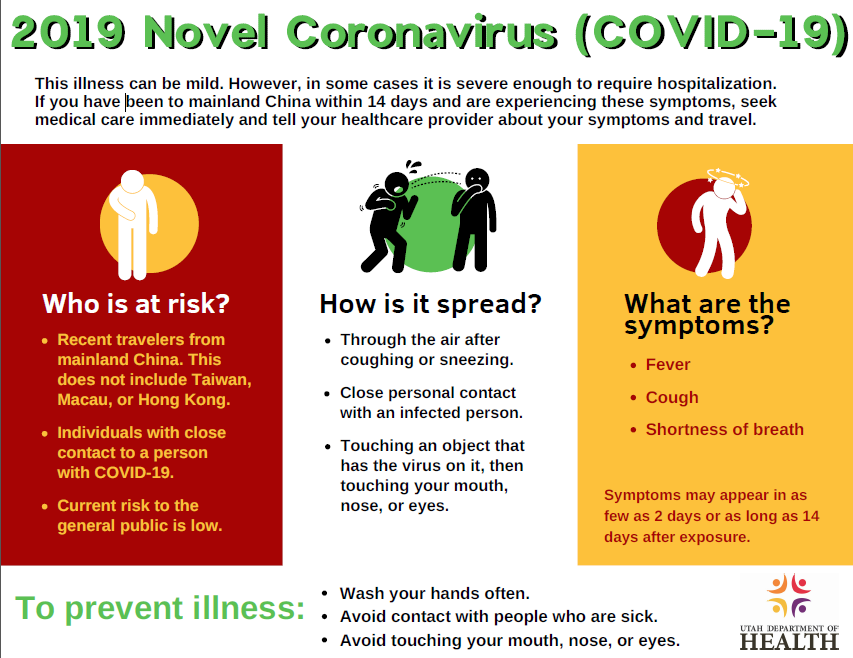Updated March 12, 2020
Centers for Disease Control and Prevention (“CDC”) is responding to an outbreak of respiratory disease caused by a novel (new) Coronavirus that was first detected in Wuhan City, Hubei Province, China and which has now been detected in 50 locations internationally, including cases in the United States. The virus has been named “SARS-CoV-2” and the disease it causes has been named “Coronavirus disease 2019” (abbreviated “COVID-19”).
On January 30, 2020, the International Health Regulations Emergency Committee of the World Health Organization (“WHO”) declared the outbreak a “Public Health Emergency of International Concern.” On January 31, 2020, Health and Human Services Secretary Alex M. Azar II declared a public health emergency (PHE) for the United States to aid the nation’s healthcare community in responding to COVID-19.
On March 11, 2020, WHO characterized COVID-19 as a pandemic. WHO also noted that, “more than 90% of cases are in just four countries, and two of those – China and the Republic of Korea – have significantly declining epidemics.” https://www.who.int/dg/speeches/detail/who-director-general-s-opening-remarks-at-the-media-briefing-on-covid-19—11-march-2020
England Logistics’ efforts to mitigate the spread of COVID-19 are centered around incorporating the CDC prevention & treatment guidelines in its employee training and education as found on the CDC website: https://www.cdc.gov/coronavirus/2019-ncov/about/prevention-treatment.html. Facts sheets similar to those attached are posted at England Logistics’ offices and have been circulated to all England Logistics employees.
In addition, England Logistics also has protocols in place to manage business from an alternate location should a particular office be negatively impacted by technology and pandemic shut-down. Such Business Continuity Plans and protocols are under constant review and testing to identify, address and remedy any newly developed risks. England Logistics is confident its plans and protocols are appropriate for the situation.
England Logistics is also sensitive and responsive to the particular situations and requests of its customers, vendors and others with whom it works. To the extent practical and reasonable, England Logistics is making efforts to accommodate specific requests and is collaborating with shippers, receivers, carriers and others to address and comply with specific instructions and unique situations.
Finally, England Logistics maintains a Policy and Procedure Pertaining to Safe Transportation of Food (“England’s FSMA Policy”) in compliance with the Sanitary Food Transportation Act of 2005 and the Food Safety Modernization Act (2011) (for convenience collectively referred to herein as “FSMA”) and the Food and Drug Administration’s (FDA) published a final rule and regulations regarding the safe transportation of human and animal food to be consumed within the United States which has been codified at 21 C.F.R § 1.900–1.934. For convenience, such regulations will be referred to herein as “the FSMA Rule.” England’s FSMA Policy has been posted and maintained on England’s website at www.englandlogistics.com for several years and may additionally be provided to you upon request.
In summary, England’s FSMA Policy defines each party’s responsibilities with respect to protecting the safety of food during transportation, including: a) practices for cleaning, sanitizing (if necessary), inspecting and maintaining vehicles and transportation equipment that the carrier provides for use in the transportation of food (See § 1.908(e)(6)(i)); b) instructions pertaining to effective measures to protect food from contamination by raw foods and nonfood items in the same load; c) protecting food transported in bulk vehicles or food not completely enclosed by container from contamination or cross-contamination during the transportation operations; and/or, d) instructions to ensure that food is transported under adequate temperature controls. See, § 1.908(3).
England’s FSMA Policy provides that England Logistics will endeavor to provide the written instructions provided by the shipping customer to the carrier arranged to transport the food and will endeavor to assign the responsibilities to comply with such instructions to the carrier. The carrier, through its acceptance of the subject load, will agree to comply with such requirements and instructions. Any assignments or reassignments of transportation operations will be made to competent supervisory personnel, which for purposes of complying with the FSMA Rule and all other purposes will be conclusively deemed to include all drivers for carriers and all loaders or other dock workers for shippers or receivers. England’s FSMA Policy requires the following of carriers:
By acceptance and/or agreeing to provide transportation or transportation operations for the subject load of food, the carrier arranged by England Logistics agrees to be responsible for all sanitary conditions and temperature control requirements applicable to the subject load as specified in writing by the shipping customer or shipper, including, but not limited to, the following:



